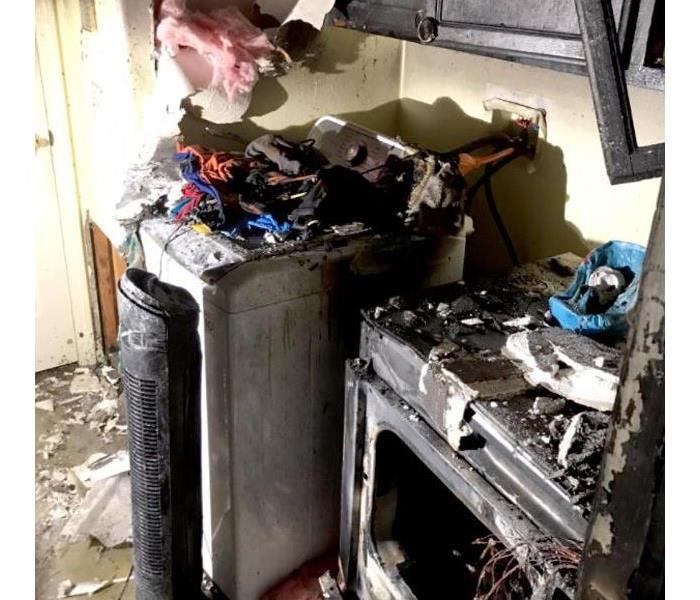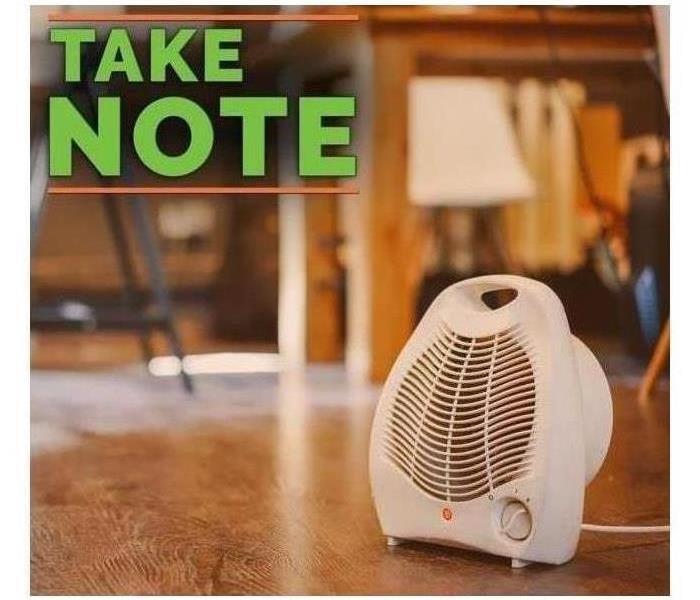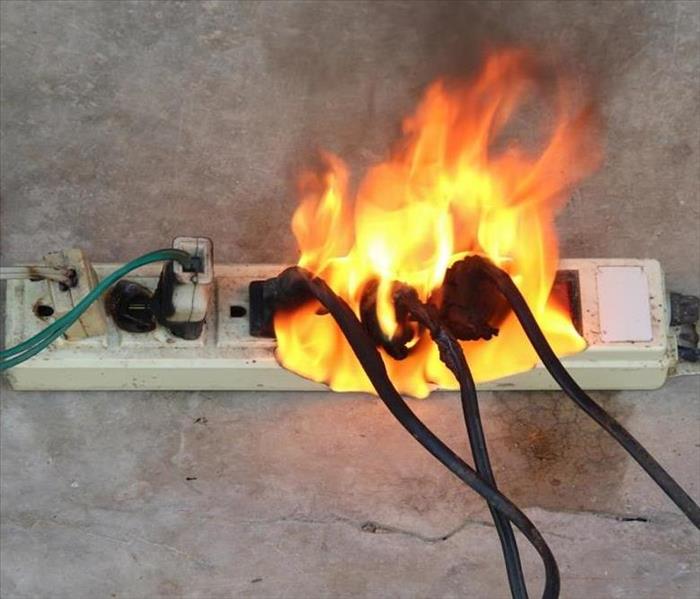Recent Fire Damage Posts
Tips from the SERVice PROfessionals: Protecting Your Property from Fire
2/1/2024 (Permalink)
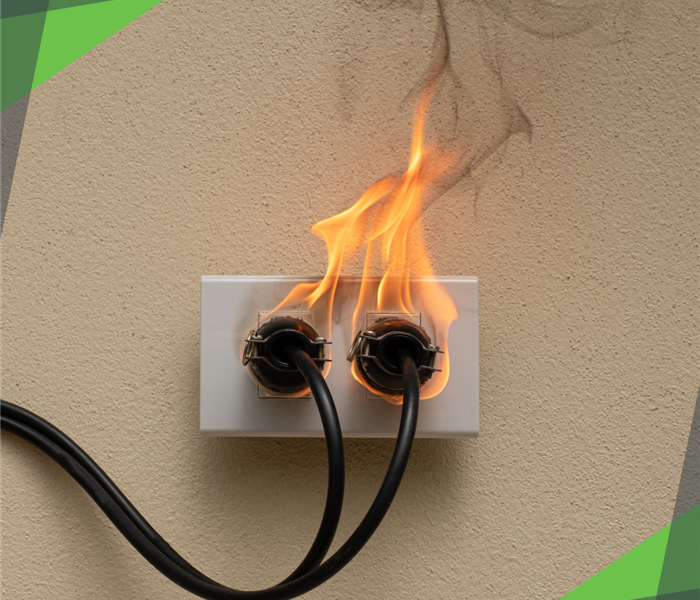 Pro Tip: Avoid overloading electrical outlets and extension cords and ensure that all appliances are turned off when not in use.
Pro Tip: Avoid overloading electrical outlets and extension cords and ensure that all appliances are turned off when not in use.
Although we are a fire and water restoration company, we would rather you prevent fires at your home and business. It is the best way to ensure the safety of your loved ones and your property. Fires can strike at any moment, and it is crucial to take the necessary steps to prevent them from happening. In this blog, we'll provide you with some valuable tips on how to keep your home and business safe from fires.
The first and most important step is to make sure that you have functioning smoke detectors installed throughout your home. Smoke detectors are the first line of defense and can alert you and your family in case of a fire. It's important to test them regularly and change the batteries at least twice a year. Because alarm sensors wear out, it is recommended to replace them at least every 10 years
Another important step is to avoid leaving cooking unattended. The kitchen is one of the most common places for fires to start, so it's essential to be cautious when cooking. Make sure that all flammable items are kept away from the stove and oven.
It's also important to have a fire extinguisher readily available in case of an emergency. Make sure that you know how to use it and that it is within reach. Furthermore, avoid overloading electrical outlets and extension cords and ensure that all appliances are turned off when not in use.
Remember that prevention is always better than restoring. By taking the necessary steps to prevent fires, you can ensure the safety of your loved ones and your home. Stay safe, and don't hesitate to contact us for any restoration needs.
SERVPRO of Jonesboro
3025 Peabody Drive | Jonesboro, AR 72404
870-934-0501 | www.SERVPROjonesboro.com
What are "soot tags?"
1/3/2024 (Permalink)
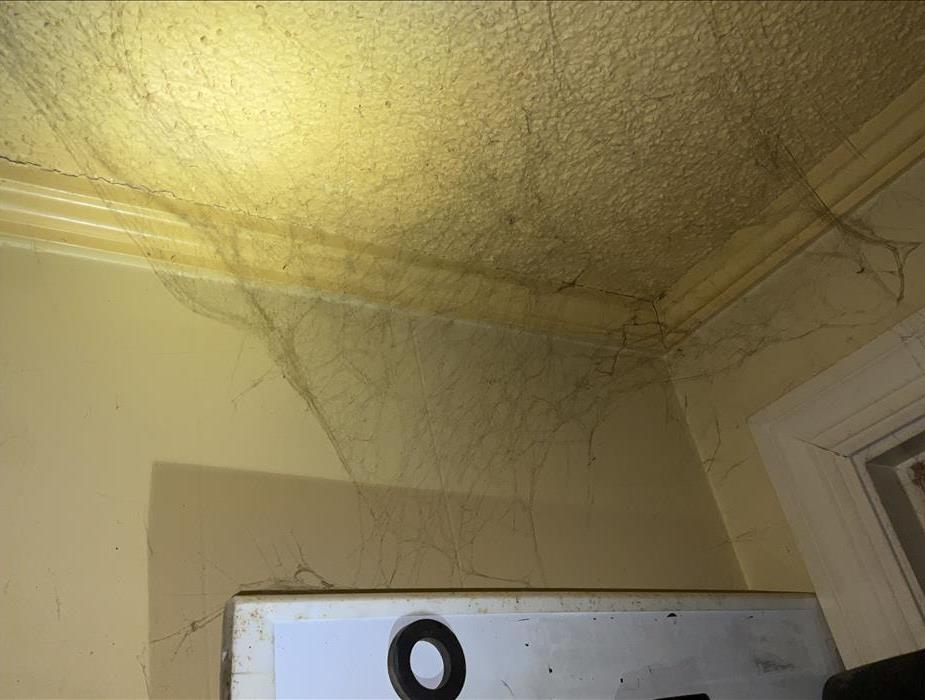 As fire restoration & remediation specialists, SERVPRO of Jonesboro pros are used to seeing the unique and often creepy appearance of soot tags.
As fire restoration & remediation specialists, SERVPRO of Jonesboro pros are used to seeing the unique and often creepy appearance of soot tags.
We all know what soot is: black smudge that often follows a fire, big or small, inside your home. You may have seen it after a candle loses its flame or the last ember dies out in your fireplace. However, when cleaning up an emergency fire’s aftermath, you may notice a strange string of web-like chains across your wall.
At first glance, it may look like you might have a spider infestation on your hands. For those with arachnophobia, don’t worry—these soot webs are actually strings of carbon and tar released from a fire called “soot tags.” To help ensure you understand how to clean up a soot-related mess, here’s a quick digest of everything you need to know about these fake spider webs or soot webs:
What are soot tags?
As fire restoration and remediation specialists, SERVPRO® of Jonesboro professionals are used to seeing the unique and often creepy appearance of soot tags. More commonly called “smoke webs” or “smoke cobwebs,” these patterns occur in low circulation areas after a fire. As the heat circulates into colder spaces, soot particles follow in chain-like formations and create webbed structures.
How should I clean up soot tags?
Cleaning up after a fire can be tricky, and you probably want to get started right away. Still, the most critical thing to remember is to wait until professionals have cleared the space before entering.
Spending any amount of extended time in an area that’s recently had a fire can expose you to lingering soot and smoke. These particles can cause long-term damage to your health, among other concerns. Those with compromised immune systems or respiratory issues should take extra care to avoid these spaces.
After a fire, SERVPRO® of Jonesboro team members will work with firefighters and other professionals to determine when it is safe for you and your family, colleagues, or friends to reenter a building. A thorough inspection by professionals before cleanup begins will help give you the peace of mind that the environment is safe and ready for entry.
Now it’s time to get rid of those pesky soot webs. In many cases, it’s recommended that you enlist the help of professionals to get rid of your soot damage—but we’ll get to that in a moment. For a small, soot web, try the following:
- Basic cleaning: use a mixture of dish soap, warm water, and a soft sponge to gently work away the soot webs. Soot tends to feel greasy, and excess agitation can cause more damage or stains.
- Melamine sponges (Magic Erasers®): known as the magic tool of cleaning, melamine sponges are an inexpensive tool that helps remove tricky stains.
- Remember to gently scrub as you clean: any harsh chemicals or movement can create an even greater problem.
When should I call professionals for help?
If the methods mentioned above aren’t doing the job, consider calling in the professionals. At SERVPRO® of Jonesboro, we offer comprehensive fire damage cleanup and remediation to get you back in your home or space as quickly as possible.
SERVPRO of Jonesboro
3025 Peabody Drive | Jonesboro, AR 72404
870-604-4725 Office | www.SERVPROjonesboro.com
Winter Warmth: A Guide to Winter Fire Safety
12/14/2023 (Permalink)
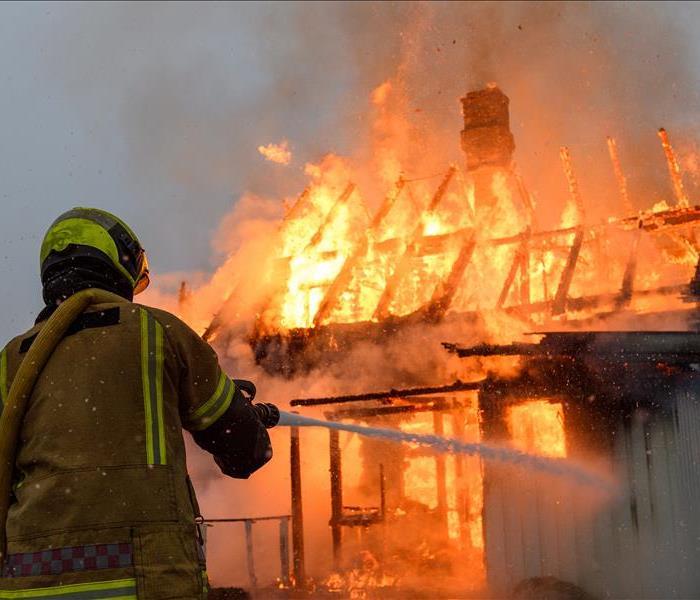 Did you know that heating equipment is one of
the leading causes of home fire deaths?
Did you know that heating equipment is one of
the leading causes of home fire deaths?
Did you know that nearly half of home heating equipment fires are reported during the months of December, January & February?
Heating equipment is one of the leading causes of home fire deaths. Fire departments responded to an estimated average of 44,210 fires involving heating equipment per year from 2016-2020, accounting for 13% of all reported home fires during this time, and these fires resulted in annual losses of 480 civilian deaths.
Heating fire facts:
Based on 2016-2020 annual averages:
- Space heaters were the type of heating equipment responsible for the largest shares of losses in home heating equipment fires, accounting for one-third of the fires, but nearly nine out of ten deaths and four out of five of the injuries in home fires caused by heating equipment.
- Fires originating in a kitchen or cooking area accounted for the largest share of home heating fires (17%).
- While the larger (non-confined) fires involving fireplaces or chimneys were involved in fewer than one in ten fires caused by heating equipment (7%), they caused just over one-fifth of the direct property damage (22%).
- Nearly half of the heating equipment fires (46%) occurred in the three-month period from December through February.
With a few simple safety tips and precautions you can prevent most heating fires from happening. Be warm and safe this winter!
- Keep anything that can burn at least three-feet away from heating equipment, like the furnace, fireplace, wood stove, or portable space heater.
- Have a three-foot “kid-free zone” around open fires and space heaters.
- Never use your oven to heat your home.
- Have a qualified professional install stationary space heating equipment, water heaters or central heating equipment according to the local codes and manufacturer’s instructions.
- Have heating equipment and chimneys cleaned and inspected every year by a qualified professional.
- Remember to turn portable heaters off when leaving the room or going to bed.
- Always use the right kind of fuel, specified by the manufacturer, for fuel burning space heaters.
- Make sure the fireplace has a sturdy screen to stop sparks from flying into the room. Ashes should be cool before putting them in a metal container. Keep the container a safe distance away from your home.
- Test smoke alarms at least once a month.
Source: NFPA Research Division
If you experience fire damage this winter SERVPRO of Jonesboro is here to help. Call us, 24/7, we're ready to respond to your emergency restoration needs. We hope you have a warm and safe winter season. Please follow these tips to ensure you and your loved ones safety.
SERVPRO of Jonesboro
3025 Peabody Drive | Jonesboro, AR 72404
870-934-0501 Office | www.SERVPROjonesboro.com
Home Cooking Fire Risk Peaks on Thanksgiving Day
11/15/2023 (Permalink)
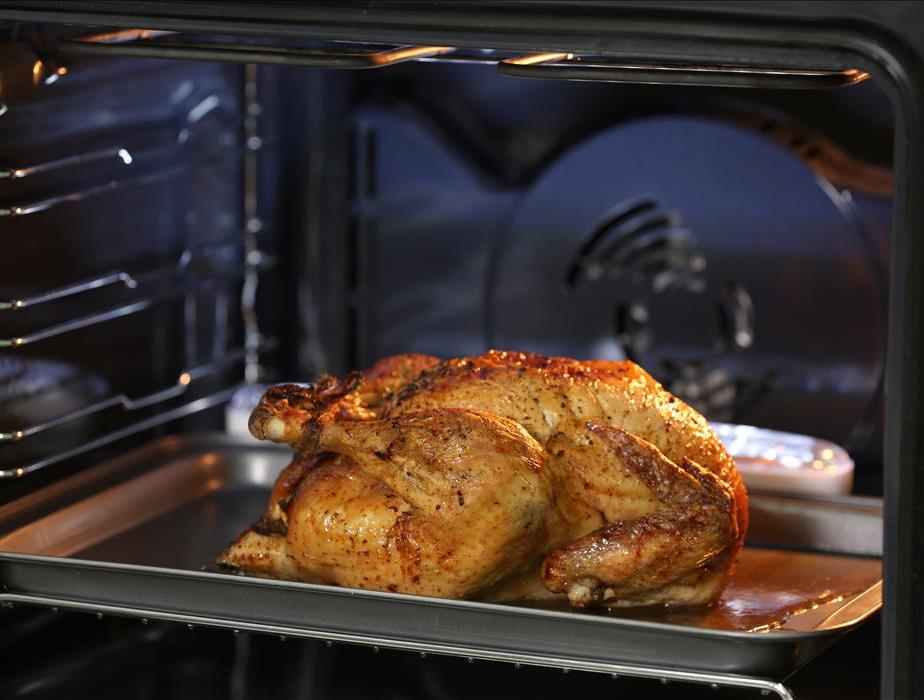 Don't burn the bird (or anything else!)
Don't burn the bird (or anything else!)
The holiday season is almost here, and it is a time when home cooking activities are at their peak. Unfortunately, all this cooking leads to a related peak in cooking fires. Cooking fires are responsible for nearly half (49%) of all home fires, according to the National Fire Protection Association (NFPA). To help keep your holidays from, literally, going up in smoke, it’s critical to know and use safe cooking practices.
According to the NFPA, Thanksgiving is the leading day of the year for home cooking fires, with more than three times the daily average for such incidents. The NFPA urges home cooks to take some basic safety steps to help prevent cooking fires.
Keep your cooking area clean and keep anything that can burn (dish towels, oven mitts, packaging) at least three feet away from cooking equipment.
Keep a close eye on what’s cooking, setting a timer to help you monitor foods with longer cooking times.
Keep in mind that the leading contributing factor to cooking fires and to fire deaths overall is unattended cooking, so plan to be at home and in or near the kitchen at all times when cooking.
For those who use a turkey fryer to cook their Thanksgiving bird, it’s important to note that more than two-thirds of home cooking fires begin with the ignition of cooking materials, including food, fat, and grease. The NFPA strongly discourages the use of these fryers. They use large amounts of oil at high temperatures, which can lead to the type of fire seen here2. If you do use one, follow all placement, use, and safety instructions carefully.
If the unexpected does happen, SERVPRO of Jonesboro specializes in disaster restoration, cleanup, and repair services, helping to remediate damage, making it “Like it never even happened” for both commercial and residential customers. For more information on SERVPRO of Jonesboro, please contact us at 870-934-0501 or cpark@SERVPROjonesboro.com. For more information on SERVPRO®, please visit SERVPROjonesboro.com.
Source: https://www.nfpa.org/Public-Education/Fire-causes-and-risks/Seasonal-fire-causes/Thanksgiving
How To Prepare For The Hottest Month Of The Year
7/1/2023 (Permalink)
 Keep your family safe this summer by maintaining your home before inclement weather approaches.
Keep your family safe this summer by maintaining your home before inclement weather approaches.
Preparing for Independence Day is not the only thing you should be planning for. As the hottest month of the year approaches, you should consider your home too. Don’t know where to start, SERVPRO can help with that.
Maintenance Is Key
Always check to ensure appliances are working properly such as your fridge, freezers, and air conditioners. A leak or default can happen at any time. Maintaining repairs during cold winters is just as important in the summer. Ensure insulation is up to par. This will keep the cool air in and more hot air outside where it belongs. You can always add insulation with the insulation you already have in place.
Fourth of July Preparation
According to The Zebra, over 18,000 fires are started due to fireworks. SERVPRO understands that accidents happen when you’re having fun with your family. Firecrackers can malfunction and cause property damage. Having a fire extinguisher handy as well as a bucket of water can help you avoid possible incidents. To use a fire extinguisher correctly, PASS:
- Pull the pin
- Aim low at the base of the fire
- Squeeze the handle slowly
- Sweep the nozzle side to side
Smoke damage from a firecracker going through a window? No problem! SERVPRO specializes in fire damage, water damage, mold restoration, and storm damage. It’s best to get the damage assessed as soon as possible.
Call 870-934-0501 if you have any questions.
Fire Extinguisher Tools You Need to Teach Your Staff
4/17/2023 (Permalink)
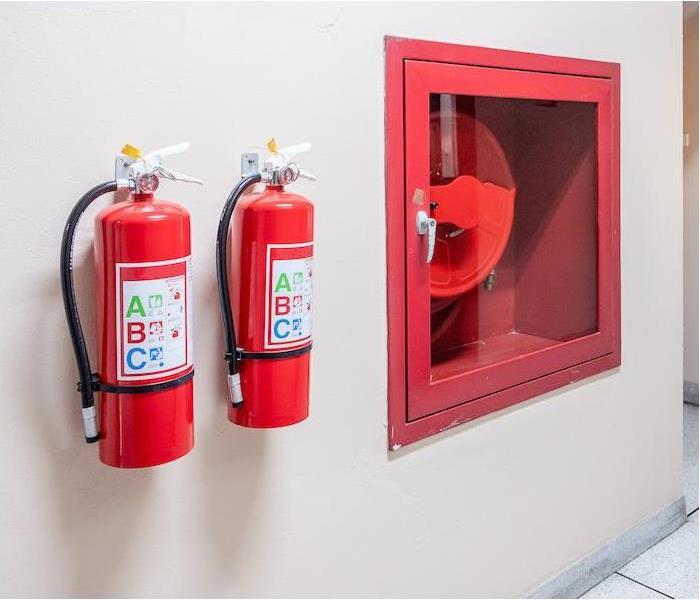 Dealing with the aftermath of a commercial fire? SERVPRO of Jonesboro is your local restoration expert.
Dealing with the aftermath of a commercial fire? SERVPRO of Jonesboro is your local restoration expert.
You might not be able to imagine a true emergency happening at work, but when you are ill-prepared for them, the outcome can be much worse. If your commercial building were to catch on fire, you need to know that there is a plan in place to ensure the best possible response.
There are some basic fire safety tools and techniques you should be teaching every member of your team, including how to use a fire extinguisher. An alarming number of people have never been trained on how to handle one of these, but with a few simple steps, you can create a much safer environment.
Start With the Fundamentals
In every business facility, there should be proper fire safety equipment. [OSHA requirements] state that if you have a fire extinguisher, you are also required to offer training to your staff in order for them to learn how to use it.
A good rule of thumb is to not only give your employees the basics on how fire extinguishers work but also to make sure they understand the different kinds of extinguishers they may need to use.
The best place to start is with the basics, so show your team how to hold and aim an extinguisher. Once they are able to securely hang onto it, then show them how to pull the pin and squeeze the handle. Flames should be extinguished with a sweeping motion, and make sure your crew knows to stay six to eight feet away as they fight the fire.
You may want to instruct your employees to use the acronym PASS as a way to remember the steps involved when it comes to fire extinguishers. Provide basic training for everyone who accesses your building once a year so that everyone has the opportunity to learn and relearn just how to respond.
While you should give everyone the opportunity to learn the fundamentals of fire safety, consider creating additional training for assigned staff members so that you can widen your response area in a disaster. When you have a reliable team that knows where to go you can get control of a situation much faster.
There’s a Time and a Place
As you put together your emergency strategy, you need to consider any unique circumstances your location or the industry your business is in could create. If your building is at a higher risk for a certain scenario, make sure that is highlighted in your training.
That might mean taking the team down to the warehouse to discuss potential chemical fires, or assuring that there is a grease fire response plan in the kitchen. There are different fire extinguishers that should be used in different situations, so it’s important to be prepared to use all of them properly.
Your safety training should also include when and how to get out if a situation warrants it. Fire extinguishers are powerful tools that can save lives and protect your property from extensive damage, but flames can quickly become out of control even with the smallest fire. It is crucial to understand when to stay and fight and when to evacuate.
Provide your staff with a communication plan and how it will be activated in the event of an emergency. This will ensure that the response time from outside help is just as fast as what is happening inside your building.
A general fire safety strategy can offer you a lot of peace of mind when it comes to protecting your employees and your assets. Once your team has the basics down, expand your plans to cover a multitude of situations and create the most effective and safe business in any emergency.
Dealing with the aftermath of a commercial fire? Our SERVPRO specialists can restore your losses and return your workplace to its pre-fire condition.
SERVPRO Is Ready After a Fire!
3/27/2023 (Permalink)
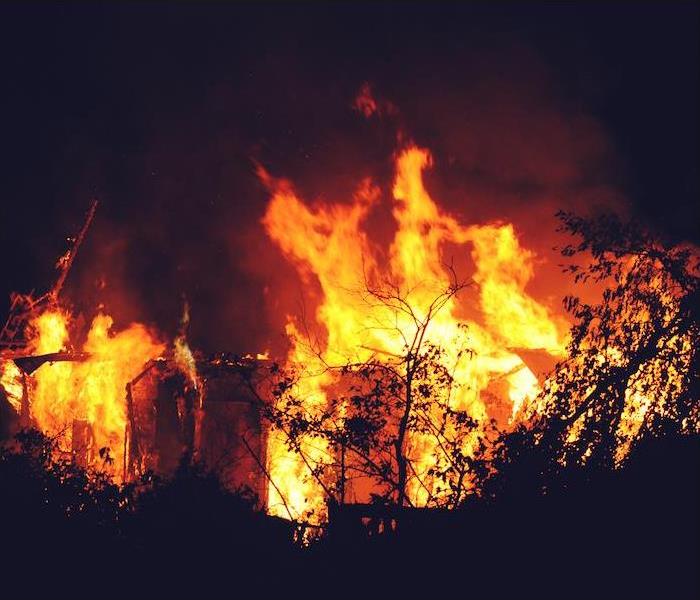 SERVPRO is faster than any other to help you when you are in need!
SERVPRO is faster than any other to help you when you are in need!
A lot of different disasters can threaten your property, and each one can create different kinds of damage. Fires, however, can be completely destructive even when they stay on a small scale.
Cleaning up after a fire might leave you wondering where to even begin and feeling completely lost. The good news is that you have a team of professionals right in your backyard that is always ready to help.
SERVPRO of Jonesboro is locally owned and operated, and we can respond the moment you need us.
Our Initial Move
If you experience a fire in your home or business, your first priority has to be getting to safety. Secure your family, and then make your next move by calling our experts and getting the cleanup started.
We are available to take your call at any time of day or night, and when we do, we will get as much information as possible in order to start forming a unique plan that will cover your entire restoration process. As we do, we will also get a team headed toward your property with all the necessary equipment.
When the team gets on the ground, they will perform an assessment of your entire property. Smoke and soot can spread quickly and affect rooms well beyond the initial burn area, so it is crucial we have a full picture of all the damages.
Time to Get to Work
After an inspection, we will start working to ensure no more damages are done to your home or business. This can include securing your property from the elements by tarping your roof or boarding up windows.
With top-of-the-line equipment and industry-leading techniques, our next step will be removing smoke and soot stains from any walls, carpets, and ceilings they may have penetrated. Once we take care of all the surface damage, we can start sanitizing to kill odors and prevent them from returning.
The Most Crucial Step
After the cleaning and sanitizing are complete, we can move to the restoration phase of the process. Whatever needs to be done in order to put your home back to just as it was before the fire, our team is ready to handle it. We will hang drywall, lay carpet, and other floorings, and paint as many rooms as required.
If your home or business had a part of the property that was damaged beyond repair and required a total teardown, we can handle the reconstruction. Our SERVPRO team has all the team and experience to carry out everything required to get your life back on track fast.
For rapid repairs following a fire, get in touch with our team at SERVPRO of Jonesboro! We will work as quickly as possible to return you to a safe and fully restored property.
Keeping Your Decorated Home Fire-Safe
3/13/2023 (Permalink)
 Keep your family safe, and take preventative measures to insure their safety at all times.
Keep your family safe, and take preventative measures to insure their safety at all times.
Can’t you just picture this…riding down the street and viewing the lovely glowing lights, walking in the house and smelling sweet baked goods, and hearing soft music floating through the air everywhere you go? It’s also time for so many events like the downtown JoyFest that bring our community together.
The holidays are such a magical time of year, but they are also a time of year when fire risks run high.
Take the time to decorate your home safely this season so you can enjoy every moment of community events, family time, and the sweet cozy feelings the season has to offer.
Top Seasonal Hazards
Every year, there are an average of 790 structure fires started due to seasonal decoration misuse.
Items hung too close to a heating source are a primary starter of these fires. Candles and Christmas trees of any variety are another risk factor for winter blazes that can leave your home in complete devastation.
If you decorate with a real tree, make sure it is watered regularly and any needles that have fallen on the ground are swept up. Artificial trees should include a fire-resistant tag, so if your tree was one that came from Grandma’s house, consider upgrading for the most safety. Don’t overload your outlets and make sure you always turn everything off at night.
Take Preventive Measures
Make the line “The stockings were hung by the chimney with care” one of your personal mottos while you decorate and avoid self-made fire hazards by hanging decorations away from any open flames.
That evergreen-scented candle might make your house smell like the season, but candles are to blame for an average of 20 house fires a day. Burn candles in an open space, and always blow them out before you leave the room.
If your home has a fireplace, make sure it is cleaned and inspected every year.
Any decorations you intend to put outside should be rated appropriately to handle the weather. Make sure lights are hung snugly with outdoor-rated nails to avoid brush fires and check your area for outdoor decorating guidelines in order to protect the safety of your community.
While you decorate with care, check your smoke detectors. Replace batteries as needed and make sure you have one near every sleeping area of your home.
Walk everyone in your house through your emergency plans and add SERVPRO to your contacts list. We can start restoration fast if your home is damaged in a fire so you can get back to enjoying the season.
Have smoke or fire damage in your house? Contact us today to get cleaned up fast.
Home Heating Safety
1/25/2023 (Permalink)
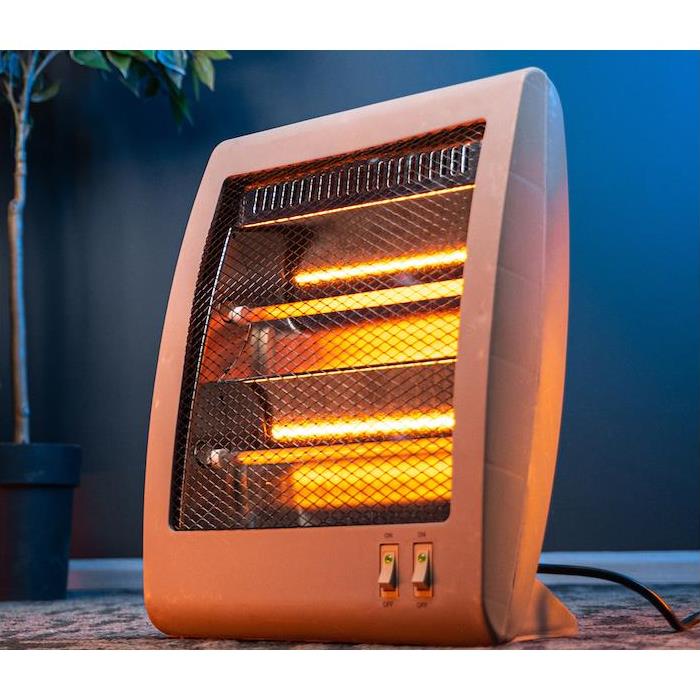 This heater can cause fire damage if it is covered or if it is not plugged directly into the wall.
This heater can cause fire damage if it is covered or if it is not plugged directly into the wall.
While it may not have seemed like it until recently, the winter season is here in full force, and you likely have flipped on the heat for the last time for at least a month or two. Flipping between heat and air is something we are all accustomed to this time of year, but if you haven’t been taking care of your heating equipment you could be setting yourself up for a fire disaster.
You should be able to be warm and comfy all season long, so take steps now to keep your family safe.
<h3basics">Furnace Basics
Since we live in a warmer climate than most, many of our homes are equipped with an HVAC/furnace combo that either runs on electricity or gas. These units can tolerate our changing temps well and are fairly economical choices, but they do need regular maintenance to run long-term.
Clean your unit regularly to ensure there isn’t an excessive amount of dust allowed to accumulate, and change your filter. It’s recommended to change filters every 90 days, but you may want to switch yours out more often if you are in and out a lot or have four-legged friends at home. The change of seasons is a great reminder to install a fresh filter.
The air filter is particularly crucial in our environment to help maintain the moisture level in your home, as well as cut down on allergens.
<h3safety">Fireplace Safety
You may not get to use that beautiful fireplace often, but it still needs some attention to avoid being a fire hazard. By taking care of it regularly, regardless of how cold the season actually gets, you can enjoy the dance of the flames whenever you want.
Clean and inspect it every season. And hey, you can always turn the AC on after you have enjoyed a toasty fire!
Wood-burning fireplaces should have ash and soot cleared out, and the chimney should be inspected to ensure there are no blockages. Artificial fireplaces should be dusted often, including any removable logs, screens, and fireplace tools.
<h3heaters">Portable Heaters
When the weather is sharing every season in one day, space heaters are a great choice to warm up a chilly morning. Space heaters are also a common cause of fires in our area though, so use them wisely.
Give your space heater at least three feet of the room away from any materials, and keep it on a flat surface. Plug the unit directly into the wall to avoid electrical fires that using an extension cord or surge protector can cause.
Make sure your whole family understands the risks of all of your heating equipment, and keep a close eye on the little ones and furry ones. Most house fires are the result of a quick and simple accident. Enjoy blanket season without worry by keeping your home safe.
If you experience fire damage this season, give us a call at SERVPRO of Jonesboro for immediate assistance. We’re here 24⁄7 when you need us!
Your Back Yard Shouldn’t Be a Fire Hazard
7/26/2022 (Permalink)
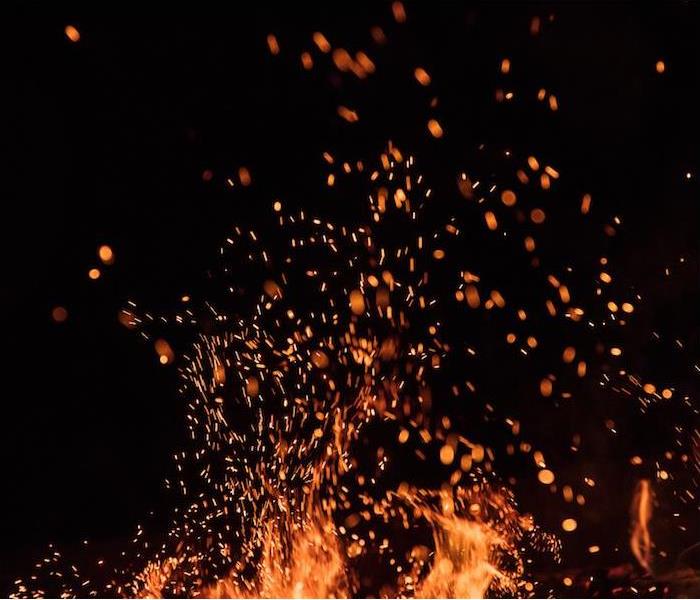 If you have experienced fire or smoke damage, contact SERVPRO of Jonesboro.
If you have experienced fire or smoke damage, contact SERVPRO of Jonesboro.
Hanging out in the backyard is already a great pastime, but when you add a nice warm fire, it makes for the perfect night. Roasting marshmallows, warming hot dogs and telling good stories can make memories your family won’t soon forget.
We use fire not just for time with the family, but to keep the pests at bay, to cook a meal, to clean leaves and to provide entertainment. Even if you think your fire is in control, though, it can quickly take a turn for the worse. According to the National Park Service 85% of wildfires are started by humans.
While our county’s risk of wildfires overall is low, Arkansas has seen plenty of forest and grass fires that grew out of hand quickly. In April, a forest fire a few hours from our neighborhood left families fleeing their homes and a total of 1,503 acres burned. We should never let our guard down when it comes to using fire outdoors.
Don’t think this means you can’t enjoy a fire in the comfort of your backyard. Grill your steaks, light citronella candles and enjoy some marshmallows, but keep up with regulations and warnings and put safety measures in place to lower your chances of things getting out of hand.
Recreational Fire HazardsOpen flames come with risks, but items such as grills, fire pits, fireworks and campfires are common ways that fires get started outside. Grills cause an average of 8,800 home fires each year when they are not used properly. Check the propane or gas before you light it, and stay near a hot grill even after you have turned it off.
When you are building a campfire, pick a spot that is a clear distance from homes or cars, and only use matches or a lighter to start the fire. Wood is the only fuel source you should use once your fire is crackling, and even after the chocolate has been eaten and the flames have burned down, you should keep an eye on the embers to watch for additional sparks.
Fire pits offer a nice alternative to a campfire, but they still need a lot of safety measures in place when you use them. Treating fire pits the same as a campfire and never placing a pit under an area with an overhang or onto a wooden surface will keep your fire where it belongs.
It might seem OK to dispose of waste or construction materials from your latest project by burning it in your pit, but stick to wood approved for burning only.
Other Outdoor Fire HazardsFire and combustible materials are risky, but we still have a need for them. We know fall can mean a lot of leaves in Arkansas. If you don’t have a disposal option like curbside pickup, burning may be a way to clean up your yard.
Open burning of yard materials is allowed, but it must be at least 25 feet from the nearest structure and the nearest property line. Burning is only allowed an hour after sunrise and an hour before sunset. Always check with city hall before you start a fire to ensure there are no current warnings.
Clearing your yard can help prevent wildfires, and together with landscaping laid out strategically it can actually provide protection for your home. Understand what to burn when before you start your fire and stay aware of all necessary safety measures to keep things in control.
Gas and combustible materials stored in a shed or garage should only be in approved containers and kept far away from kids. Gas should only be used for yard tools and other items that require it, which means you can’t use it to make the campfire glow a little brighter.
If you do experience a damaging fire, give us a call. SERVPRO is ready 24⁄7 to take care of every part of fire damage, and it is our hope and goal to restore rather than replace as much of your property as possible.
Burn safely outdoors. And save some chocolate for us! If you have experienced fire or smoke damage, contact us today to get restoration started faster.
Steps to Take to Prevent Fire in the Home
5/24/2022 (Permalink)
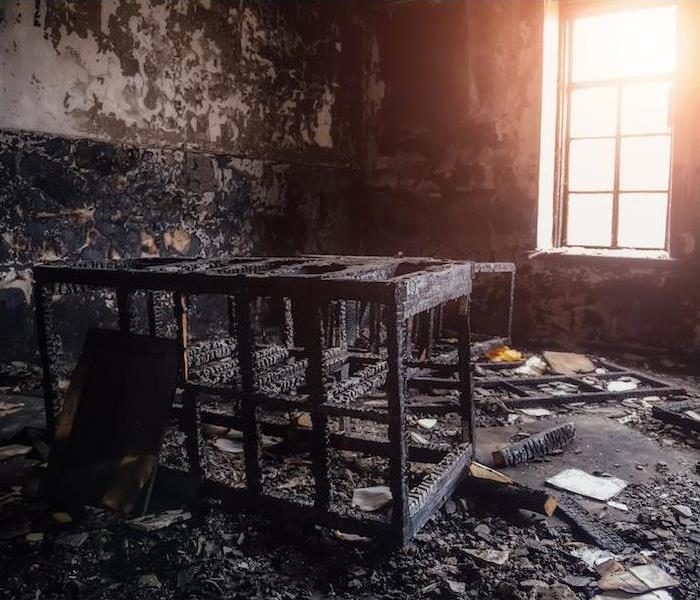 If your home is damaged in a house fire, SERVPRO of Jonesboro is here to help. Contact us at (870) 934-0501 for any fire restoration needs.
If your home is damaged in a house fire, SERVPRO of Jonesboro is here to help. Contact us at (870) 934-0501 for any fire restoration needs.
The American Red Cross has responded to more than 20,000 house fires already in 2022, and that only represents some of the total number of fires across the United States.
Smoke detectors are the best preventive tool in your home, but there are steps you can take to protect your life and loved ones. Even simple acts of cleaning can help make your home fire-safe.
Clear the ClutterClutter may be a daily battle in your home already, but letting spaces like stairs, halls, and utility areas pile up can be a fire hazard. Extra clothing, blankets, and pillows are fuel to a fire, furthering its spread.
Cloth items left near a water heater can actually start a fire when the water heater turns on. The more you allow your spaces to stay open, the slower a fire can progress and the safer you are able to exit in the event of an emergency.
Overloaded extension cords are another area of your home with a high fire risk. Remove any electrical appliances you don’t use, and unplug those that you don’t use frequently.
Always leave plenty of room between furniture and wall outlets to avoid overheating by allowing for proper airflow.
Create a Defensible Space in Your YardYour yard can protect your home from fires that originate outside. Being intentional with your landscaping both allows space for firefighters to work and slows the progression of a fire before it gets to your house.
This is so effective that states like California have actually imposed defensible zone regulations for yards, but this type of yard work is smart everywhere. We frequently experience high winds, tornadoes, and severe thunderstorms here, especially in the spring. Our yards are key in stopping electrical fires spurred by these storms.
This doesn’t mean you have to limit what you plant, rather it means strategically placing your plants and trees to offer the most protection. You should also keep your yard clear of dead plants and limbs as these serve as fuel for fires and contribute to the spread. After one of our strong storms clears out, go outside and clean up. It does more than improve appearances.
Keep It Clean & Keep It SafeCleaning the clutter from your home and yard is only part of how you can protect your house. Have your chimney inspected yearly, and clean your stove regularly to eliminate two high fire risk areas.
It isn’t only deep-cleaning that acts as prevention either; even dusting protects your home. Kill those dust bunnies with pleasure, especially around electrical appliances and wall outlets.
Our homes are no longer only a place of rest—these days, we work, play, and learn in them. Keeping it clean is the easiest way to prevent a disaster from fire.
If you have experienced fire damage or want to learn more about our fire damage restoration services, contact us today. We’re here to act fast, 24⁄7.
Prevent a Dryer Fire
5/5/2022 (Permalink)
Do you have a dryer? Of course, you do. One of the most commonly found appliances in homes can cause damage if not taken care of properly. The fear of a dryer fire is one that is not commonly heard of, however, it is a threat that you should be aware of. According to the U.S. Consumer Product Safety Commission, there are an estimated annual 15,500 fires, 10 deaths, and 10 injuries due to clothes dryer fires. In some cases, faulty appliances are to blame, but many fires can be prevented with proper dryer venting.
Here are some small steps to take to Avoid a Dryer Fire:
1. Dryers produce large amounts of lint. Be sure to clean the lint trap after EVERY use of the dryer.
2. Dryer Vents should ONLY be made of metal and be short and straight. Bends and curves result in lint buildup increasing the risk of a fire.
3. Do not run the dryer when you are away from home or sleeping.
Following these tips will greatly reduce the chances of a dryer fire at your home. However, if a fire does occur call SERVPRO of Jonesboro at 870-934-0501.
Fire in Your Dryer?
3/1/2022 (Permalink)
When talking about fire safety in the home there are things like smoke detectors and fire extinguishers that are obvious, but there are also some that are not so obvious, like your dryer vents for example. Have you had yours cleaned recently? Here are some signs that it might have been a little too long since your last dryer vent cleaning.
- Hot Dryer and Clothes – If your clothes are coming out of the dryer hotter than usual or the outside of the dryer feels extra hot, the culprit may be a dirty dryer vent not allowing heat to dissipate as well
- Clothes Taking Too Long to Dry – On the flip side, if you find that your clothes are taking too long to dry and require more than one cycle to finish this could also be a problem with the dryer vent, as a clogged vent will not allow any of the water vapor to be removed from the dryer keeping everything wet for longer
- Smell – If the dryer is in use and you smell a burning smell this is a huge issue, you should turn off the dryer immediately. The exhaust tube, lint trap, and drum of the dryer can get clogged and cause a fire hazard from lint buildup
You should have your dryer vent inspected and cleaned at least once a year to prevent any dangerous situations in your home. Give us a call here at SERVPRO of Jonesboro and let our team of professionals come out and help keep your home safe from accidental fires.
Call SERVPRO of Jonesboro for Your Fire Damage in NEA
2/21/2022 (Permalink)
Water and Fire Damage Can Cause Extensive Damage in Westwood Homes
Fires start in homes and buildings for many reasons. A burning cigarette casually discarded, electrical short circuits or even a candle left burning can initiate a fire that causes extensive damage to a home and the contents.
While fire damage in Northeast Arkansas homes can be catastrophic, so can the damage caused by the fire department in quelling the fire. The fire department uses lots of water, or in some cases, foam fire retardants to remove oxygen from the fire. SERVPRO removes all of the water and chemicals, and damaged material before restoration can begin.
SERVPRO has extensive experience managing the aftermath of this kind of damage. Our team provides all of the services required after a fire, including:
- Board up of windows and doors, tarps covering the roof
- Removal of water and chemicals, moisture removal, and drying
- Soot and smoke removal from all surfaces
- Sanitize and cleaning of all recoverable contents
- Restoration of your home or business to its preloss condition
Contact SERVPRO of Jonesboro for fire damage services to your residential and commercial buildings. We can help 24/7. Call 870-934-0501
Do You Have a Fire Plan?
2/21/2022 (Permalink)
In a fire, seconds count. Seconds can mean the difference between residents of our community escaping safely from a fire or having their lives end in tragedy.
It reinforces why everyone needs to have an escape plan.
- Draw a map of your home with all members of your household, marking two exits from each room and a path to the outside from each exit.
- Practice your home fire drill twice a year. Conduct one at night and one during the day with everyone in your home, and practice using different ways out.
- Teach children how to escape on their own in case you can’t help them.
- Make sure the number of your home is clearly marked and easy for the fire department to find.
- Close doors behind you as you leave – this may slow the spread of smoke, heat, and fire.
- Once you get outside, stay outside. Never go back inside a burning building.
via http://www.nfpa.org/
Have you contacted your local fire department? See how you can get involved with them and your community to prevent house fires. Sometimes they will have events or give out smoke detectors for your home. Don't think this could never happen to you because it easily could. We don't have control over everything in our homes! Be safe and have a plan!
Fire Safety Should ALWAYS be a Priority!
2/15/2022 (Permalink)
In a fire, even seconds count. Seconds can mean the difference between residents of our community escaping safely from a fire or having their lives end in tragedy.
It reinforces why everyone needs to have an escape plan.
- Draw a map of your home with all members of your household, marking two exits from each room and a path to the outside from each exit.
- Practice your home fire drill twice a year. Conduct one at night and one during the day with everyone in your home, and practice using different ways out.
- Teach children how to escape on their own in case you can’t help them.
- Make sure the number of your home is clearly marked and easy for the fire department to find.
- Close doors behind you as you leave – this may slow the spread of smoke, heat, and fire.
- Once you get outside, stay outside. Never go back inside a burning building.
via http://www.nfpa.org/
Have you contacted your local fire department? See how you can get involved with them and your community to prevent house fires. Sometimes they will have events or give out smoke detectors for your home. Don't think this could never happen to you because it easily could. We don't have control over everything in our homes! Be safe and have a plan!
Cleaning Contents Affected By Smoke
9/15/2021 (Permalink)
Whenever a fire starts inside a building, smoke can affect numerous items. During a fire, combustion, the process of a solid turning into a gas by applying heat takes place. Smoke is created by materials that do not burn completely.
During a burn, smoke can travel all over the structure which causes various problems. A big part of mitigating fire damage is dealing with smoke-related issues. When a blaze takes place materials all over the home, get coated in soot residue, and foul odors are left behind.
When restoring a house damaged by smoke, our SERVPRO technicians inspect the structure to figure out which areas got affected. We determine which cleaning methods to use based on how concentrated the soot is, the type of residue present, and the kind of materials affected. If the soot is heavily concentrated, then it can be difficult to clean whereas light residues can be wiped off easily.
A fire creates different kinds of smoke throughout its duration based on the materials it burns, the speed of combustion, and the amount of oxygen. When synthetic materials are burned, they create soot that adheres to surfaces better than residues resulting from natural substances such as wood. Fires that burn slow and lack oxygen produce wet smoke that can be extremely difficult to remove compared to quick-burning fires that create dry smoke.
The type of materials surfaces are made of also affects the cleanability of soot residues. Non-porous materials such as plastic and metal repel moisture well making them easy for our SERVPRO technicians to clean using wet, water-based chemicals. Non-porous materials such as softwood and upholstery absorb soot residues better, and they can penetrate deep into the material. Water-based chemicals can soak the soot deeper into the material causing them to get ruined. Dry cleaning methods such as wiping with a dry sponge prove to work better in removing soot from porous substances.
Various methods are available to use when dealing with multiple types of soot residues affected by different kinds of materials. There are different types of cleaning chemicals as well as application methods that are designed specifically for dealing with certain situations.
SERVPRO of Jonesboro is here to help you 24/7/365 with any fire damage and restoration issue.
Please call us at 870-934-0501
Your Fire Cleaning Experts
6/10/2021 (Permalink)
Every situation has its differences, but overall, the bigger and hotter the fire, the more difficult the clean-up will be. Here at SERVPRO of Jonesboro, we use a combination of tactics including cleaning, deodorizing and sealing of materials to clean up from fire damages.
Some of the basic information that is important when discussing fire damage restoration is: To know that the process involved will definitely differ depending on the severity and size of the fire and damage caused. However, the principles of fire damage restoration will for the most part be the same. Like in most restoration projects the main goal we are trying to reach is preloss condition, that is you want your property to be restored back to how it was before the damages occurred; you want it to be safe, clean, odor free, and looking as if it never even happened.
Grill Fires
5/25/2021 (Permalink)
Grilling is a fun activity that brings families and friends together to enjoy great food and time outside. If you aren't careful, however, a grill fire may occur, potentially causing injuries and smoke damage.
Choose a Safe Location
To prevent fires from spreading to your home, operate the grill at a safe distance away from the building. Avoid grilling on a balcony, patio, deck, or other areas that are close to your house. Instead, position the grill in a clear area of your yard.
Clean the Grill Frequently
Burnt remnants on the grill can catch fire easily. After you are done grilling, allow the grill to fully cool and then thoroughly clean it. Always check that it is clean before turning it on.
Know-How To Put Out a Fire
Knowing how to put a fire out and having the right supplies on hand is just as important as preventing fires. Here are some tips:
- If the propane tank is on fire, get as far away as you can and call the fire department.
- Cut off oxygen by closing the grill's lid.
- Turn the grill off if possible.
- If the fire does not stop, spray it with a fire extinguisher or cover it with baking soda to cut off the oxygen.
If you do happen to experience a grill fire that causes damage to your home, be sure to call SERVPRO of Jonesboro at 870-934-0501.
Fire Mitigation Experts
5/12/2021 (Permalink)
Fire damage requires experienced technicians who can clean and clear away all traces of smoke and damage caused by a fire. That's why we send our technicians to IICRC training. We expect the best from our team. There is no easy fix to remove smoke stains and odors caused by fire. SERVPRO has created some really special cleaning agents that actually remove all traces of smoke damage. There are many reasons why we're the best in the industry. We create our own unique products to complete our jobs. We wouldn't trust any other product to complete the cleaning process. If only we could take a picture of the before and after SMELL of fire damage! You have to smell it to believe it!
10 Fire Safety Tips for Kids
3/5/2021 (Permalink)
It is important to communicate the dangers and safety of fire to children. These ten tips will help prevent fires in your home and help with staying calm and safe in case of an emergency.
- Be sure to keep matches and lighters in areas where children cannot reach. It is best to keep them in high or locked cabinets. Teach kids to bring any matches and lighters they may find to an adult to be put away safely.
- Check Your House for Smoke Detectors. There should be a smoke detector on every floor of your home. Check to make sure that the batteries are working and do not need to be replaced. Most fire departments recommend changing batteries twice a year.
- Check Your House for Fire Hazards. Electrical cords and fireplaces should be checked regularly to make sure they are working properly. For smoking adults, disposing of ashes in a metal container can help to prevent a fire.
- Make a family fire safety plan in case the fire alarm goes off when you least expect it. The alarm could go off in the middle of the night and you need to evacuate quickly. Talk to all family members about how to exit the house safely and a safe outside location to meet. A safe outside location can be a neighbor’s house, a big tree away from the house, or across the street.
- Practice your fire safety plan with your family. Practicing your plan will help to ensure that everyone knows what they are doing. Checks windows and screens to make sure they open when necessary.
- Remember to go over the importance of getting outside as soon as possible. Fire can be scary, but it is important to never hide during a fire. Get outside as quickly as you can and wait at an assigned meet location.
- Fall to the ground and crawl your way out. The ground is where there is less smoke in the air and you can crawl your way to safety.
- Stop. Drop, and Roll if your clothes are on fire. Continue to roll until it out. Do Not Run as it can make the fire spread faster.
- Never go back into a burning building! Your family created a fire safety plan and should stick with it. Once you arrive at your designated meeting location, wait there until your family arrives.
- Know your emergency phone numbers. Call 9-1-1 in the event of an emergency. Also, teach children a nearby contact number who could respond quickly in case of an emergency.
Preparing for a Home Fire
2/17/2021 (Permalink)
7 Ways to Prepare for a Home Fire
- Test fire alarms at least once a month and replace the batteries at least once a year.
- Teach children what smoke alarms sound like and what to do when they hear one.
- Plan escape routes and make sure all family members know the safe place to meet outside the home.
- Establish a family emergency contact plan and ensure all household members know who to contact in separated.
- Have a practice fire drill at your home at least twice a year. This can be done by pressing the smoke alarm test button or yelling “Fire” to alert everyone they must go.
- Make sure everyone knows how to call 9-1-1.
- Teach household members to Stop, Drop, and Roll if clothes catch on fire.
Grease Fire Safety Tips
2/12/2021 (Permalink)
Cooking is the number one cause of home fires and injuries. Knowing how to extinguish a grease fire can help you, your family, and friends from getting hurt or having a severe house fire.
If a grease fire starts:
- Cover the flames with a metal lid or sheet pan. Leave the cover on until it has cooled.
- Turn off the heat source.
- If it is small and manageable, pour baking soda or salt on it to smother the fire.
- As a last resort, spray the fire with a chemical fire extinguisher
- Do not use water!
- Do not attempt to move the pot/pan outside.
DO NOT use four, baking powder, or other cooking powders. They could cause the fire to become worse.
If you are unable to extinguish the grease fire:
- GET OUT! You need to leave as soon as possible.
- When you leave, close the door behind you. This will help contain the fire inside.
- When you get to a safe distance, call 911.
Call SERVPRO of Jonesboro at (870)934-0501 if you experience a fire, and need our assistance with fire mitigation.
Heating Equipment Safety Tips
2/2/2021 (Permalink)
Did you know? Heating equipment is the second-leading cause of U.S. house fires. Also, December, January, and February are the leading months for home heating fires. With this in mind as we are experiencing these colder months, and using different types of heating equipment in our homes, here are a few safety tips to keep in mind to help reduce your risk of a heating-related fire.
- Keep anything flammable at least three feet away from heating equipment., like the furnace, fireplace, wood stove, or portable space heater. Have a three-foot "kid-free" zone around open fires and space heaters.
- Make sure the fireplace has a sturdy screen to stop sparks from flying into the room. Ashes should be cool before putting them in a metal container a safe distance away from your home.
- Remember to turn portable heaters off and unplug them when leaving the room or going to bed.
- Always use the right kind of fuel, specified by the manufacturer, for fuel-burning space heaters.
- Have heating equipment and chimneys cleaned and inspected every year by a qualified professional.
- Have a qualified professional install stationary space heating equipment, water heaters, or central heating equipment according to the local codes and manufacturer's instructions.
- Test smoke alarms monthly.
If your residence does happen to suffer fire damage, contact SERVPRO of Jonesboro at (870)934-0501 to help make it “Like it never even happened.”
Minimizing Fire Damage
5/7/2020 (Permalink)
The first 48 hours after a fire can often mean the difference between restoring and replacing your property and personal items. SERVPRO of Jonesboro can provide timely response with mitigation services ranging from fire, smoke and soot removal, to contents claims inventory, and document restoration. These services help ensure that your property, belongings, and memories are restored to preloss conditions when possible.
If you have experienced fire damage in your home or business, here is what to expect from us:
One Hour: Within one hour from notice of loss, a SERVPRO professional will contact you to arrange service.
Four Hours: Within four hours from notice of loss, our certified technicians will be onsite to assess the damage.
Eight Hours: Within eight hours of on-site arrival, certified technicians will be working to clean, restore, and deodorize. Pre-cleaning for restoration is done to prevent any further damage from soot and smoke.
Detailed Explanation: A SERVPRO technician will walk you through the job process step-by-step, explaining what to expect, and the anticipated outcome. We then use state-of-the-art restoration techniques to ensure your home or business is back to normal, in an appropriate timeframe.
Final Walk-Through: After the work has been completed, a final walk-through will be conducted with you to help ensure your satisfaction.
Power Strip Safety
5/4/2020 (Permalink)
In today's world, it seems as if we can never have enough power outlets for all of our electrical devices. A common solution for this is the use of power strips. These tools power multiple devices, from their multiple electrical sockets. Although they are very helpful, if they are used improperly or if they malfunction, power strips can pose a serious fire risk. Here are some safety tips about power strips:
- Use only power strips that have an internal circuit breaker.
- Power strips are not a substitute for permanent wiring.
- At no time should a power strip be placed in a situation that will allow it to be exposed to a moist environment.
- Do not plug a power strip into an existing power strip.
- There should only be one power strip plugged into a single electrical outlet.
- Do not place a power strip in any area where the unit would be covered with carpet, furniture, or any other item that will limit or prevent air circulation.
- When the power strip is not in use, unplug the unit.
- Power strips should have a cord of no more than 6 feet in length.
via https://www.ucop.edu/risk-services/_files/bsas/safetymeetings/powerstripsafety.pdf
If you need our services, SERVPRO of Jonesboro can be reached at (870)934-0501 or visit us online at www.SERVPROjonesboro.com.
Do you have a Fire Escape Plan?
3/18/2020 (Permalink)
In a fire, seconds count. Seconds can mean the difference between residents of our community escaping safely from a fire or having their lives end in tragedy.
It reinforces why everyone needs to have an escape plan.
- Draw a map of your home with all members of your household, marking two exits from each room and a path to the outside from each exit.
- Practice your home fire drill twice a year. Conduct one at night and one during the day with everyone in your home, and practice using different ways out.
- Teach children how to escape on their own in case you can’t help them.
- Make sure the number of your home is clearly marked and easy for the fire department to find.
- Close doors behind you as you leave – this may slow the spread of smoke, heat, and fire.
- Once you get outside, stay outside. Never go back inside a burning building.
via https://www.nfpa.org/Public-Education/Staying-safe/Preparedness/Escape-planning
Have you contacted your local fire department? See how you can get involved with them and your community to prevent house fires. Sometimes they will have events or give out smoke detectors for your home. Don't think this could never happen to you because it easily could. We don't have control over everything in our homes! Be safe and have a plan!
SERVPROjonesboro.com
870-934-0501 Call us 24/7/365 for all your emergency needs.
Space Heater Fire
2/18/2020 (Permalink)
HOME HEATING FIRES
Fast Facts
• Heating fires are the second leading cause of home fires.**
• Fixed and portable space heaters, including wood stoves, are involved in 74 percent of fire-related deaths.**
• Nearly half of American families use alternative heating sources such as space heaters, fireplaces, or wood/coal stoves to stay warm.*
• Each year over 200 people die from carbon monoxide produced by fuel-burning appliances in the home including furnaces, ranges, water heaters, and room heaters.***
• The number of home fires the American Red Cross has responded to has risen 10% since 2000.*
• Only 26 percent of families have actually developed and practiced a home fire escape plan.*
• Eighty percent of Americans don’t realize that home fires are the single most common disaster across the nation.*
• Having a working smoke alarm reduces one’s chances of dying in a fire by nearly half.**
Prevention Tips
- Keep all potential sources of fuel like paper, clothing, bedding or rugs at least three feet away from space heaters, stoves, or fireplaces.
- Portable heaters and fireplaces should never be left unattended. Turn off space heaters and make sure any embers in the fireplace are extinguished before going to bed or leaving home.
- If you must use a space heater, place it on a level, hard and nonflammable surface (such as ceramic tile floor), not on rugs or carpets or near bedding or drapes. Keep children and pets away from space heaters.
- When buying a space heater, look for models that shut off automatically if the heater falls over as another safety measure.
- Never use a cooking range or oven to heat your home.
- Keep the fire in your fireplace by using a glass or metal fire screen large enough to catch sparks and rolling logs.
- Have wood and coal stoves, fireplaces, chimneys, and furnaces professionally inspected and cleaned once a year.
- Visit www.redcross.org/homefires for more information on how to prevent heating fires.
Sources: American Red Cross,* U.S. Fire Administration,** and the US Consumer Product Safety Commission.***
https://www.redcross.org/content/dam/redcross/National/m4340085_FireHomeHeatingFactSheet.pdf
If you need service SERVPRO of Jonesboro can be reached at 870-934-0501 or online at SERVPROjonesboro.com
After a fire, it's NOT cob webs you're seeing
2/18/2020 (Permalink)
Did you know?
Residues (such as burning plastics or the soot from furnace disorders) form long chains of ionized smoke particles that assemble in corners or at junctions of walls and ceilings which are called smoke webs!
Often times our customers make the comment that they didn't realize their home or business was so dirty. In a time of stress during a disaster, they are often relieved to know that smoke webs were caused by the fire and not from lack of cleaning.
Does your business have a plan? Check out these tips:
Protect your people: Your employees are your most important business asset. These tips can help prevent them from being injured in a fire.
- Fire Plans: Make sure your employees know what to do if there's a fire, including calling 911 immediately. Conduct a fire drill at least once a year to keep employees aware of your workplace fire safety protocol.
- Evacuation Plan: In larger buildings, post a fire evacuation plan in several spots around the workplace. Never include elevators in an evacuation plan; always use the stairs.
- First Aid: In case of fire injuries, your employees should be familiar with the location of the first-aid kit, which should be kept where possible hazards can occur most-such as in the kitchen.
PRACTICE FIRE SAFETY AND EVACUATION AT HOME AS WELL. WHAT WILL PARENTS AND CHILDREN DO IF A FIRE BREAKS OUT DURING SLEEPING HOURS?
https://www.statefarm.com/simple-insights/planning/3-business-fire-prevention-tips
Call us at 870-934-0501 or visit us online at www.SERVPROjonesboro.com
It's not Cob Webs
3/21/2019 (Permalink)
Did you know?
Residues (such as burning plastics or the soot from furnace disorders) form long chains of ionized smoke particles that assemble in corners or at junctions of walls and ceilings which are called smoke webs!
Often times our customers make the comment that they didn't realize their home or business was so dirty. In a time of stress during a disaster they are often relieved to know that smoke webs were caused by the fire and not from lack of cleaning.
Does your business have a plan? Check out these tips:
Protect your people : Your employees are your most important business asset. These tips can help prevent them from being injured in a fire.
- Fire Plans: Make sure your employees know what to do if there's a fire, including calling 911 immediately. Conduct a fire drill at least once a year to keep employees aware of your workplace fire safety protocol.
- Evacuation Plan: In larger buildings, post a fire evacuation plan in several spots around the workplace. Never include elevators in an evacuation plan; always use the stairs.
- First Aid: In case of fire injuries, your employees should be familiar with the location of the first-aid kit, which should be kept where possible hazards can occur most-such as in the kitchen.
PRACTICE FIRE SAFETY AND EVACUATION AT HOME AS WELL. WHAT WILL PARENTS AND CHILDREN DO IF A FIRE BREAKS OUT DURING SLEEPING HOURS?
https://www.statefarm.com/simple-insights/planning/3-business-fire-prevention-tips
Call us at 870-934-0501 or visit us online at www.SERVPROjonesboro.com
Restore vs Replace
3/21/2019 (Permalink)
What would you do if...
You receive a call from a client today with a fire loss?
You have a fire loss on one of your properties?
You have a fire at your own personal property?
Some statistics...
Fire claims spike during the months of November - February.
On average, Fire causes over $12.4 billion in property damage annually.
Top 5 Causes of Fire loss:
Cooking equipment
Heating equipment
Intentional
Electrical distribution & lighting equipment
Smoking materials
After the fire is out...
You need a company "Like SERVPRO"
Industry research from 2016 by Buntin Group found that SERVPRO Brand is becoming synonymous with the services provided!
Why not a Contractor?
Mitigate, clean, & restore FIRST! Then repair and rebuild.
SERVPRO of Jonesboro can handle it all - One Stop Shop.
By the way...
WE DO BOARDUP!
Many times, the home or building must be secured immediately BEFORE anything else.
Call us 24/7 at 870-934-0501 or visit us online at www.SERVPROjonesboro.com
Have a Plan
3/14/2019 (Permalink)
In a fire, seconds count. Seconds can mean the difference between residents of our community escaping safely from a fire or having their lives end in tragedy.
It reinforces why everyone needs to have an escape plan.
- Draw a map of your home with all members of your household, marking two exits from each room and a path to the outside from each exit.
- Practice your home fire drill twice a year. Conduct one at night and one during the day with everyone in your home, and practice using different ways out.
- Teach children how to escape on their own in case you can’t help them.
- Make sure the number of your home is clearly marked and easy for the fire department to find.
- Close doors behind you as you leave – this may slow the spread of smoke, heat, and fire.
- Once you get outside, stay outside. Never go back inside a burning building.
via http://www.nfpa.org/
Have you contacted your local fire department? See how you can get involved with them and your community to prevent house fires. Sometimes they will have events or give out smoke detectors for your home. Don't think this could never happen to you because it easily could. We don't have control over everything in our homes! Be safe and have a plan!
What To Do Until Help Arrives
2/5/2019 (Permalink)
A fire can leave behind soot, smoke damage and a host of other problems. Ceilings, walls, woodwork, carpeting, and other floor coverings will often need a thorough professional cleaning. If your home or business suffers a fire, it is important to take the appropriate steps to prevent further damage until your local SERVPRO of Jonesboro arrives. The following tips may help reduce damage and increase chances of a successful restoration.
DO:
-Limit movement in the home to prevent soot particles from being embedded into upholstery and carpet.
-Keep hands clean. Soot on hands can further soil upholstery, walls and woodwork. Place dry, colorfast towels or old linens on rugs, upholstery and carpet traffic areas.
-If electricity is off, empty freezer/ refrigerator completely and prop doors open to help prevent odor.
-Wipe soot from chrome kitchen/ bathroom faucets, trim and appliances, then protect these surfaces with a light coating of lubricant such as Vaseline.
-If heat is off during winter, pour RV antifreeze in sinks, toilet bowls, holding tanks and tubs to avoid freezing pipes and fixtures. Also drain the water heater and open all outside water spigots to water can drain.
-Tape double layers of cheesecloth over air registers to stop particles of soot from getting in or out of the HVAC system.
SERVPRO of Jonesboro wants to save you the hassle and worry from many of these steps so please call us for all your fire damage needs and let our professional team do the work for you.
870-934-0501
What Would You Do?
2/5/2019 (Permalink)
What would you do if...
You receive a call from a client today with a fire loss?
You have a fire loss on one of your properties?
You have a fire at your own personal property?
Some statistics...
Fire claims spike during the months of November - February.
On average, Fire causes over $12.4 billion in property damage annually.
Top 5 Causes of Fire loss:
Cooking equipment
Heating equipment
Intentional
Electrical distribution & lighting equipment
Smoking materials
After the fire is out...you need SERVPRO of Jonesboro!
Why not a Contractor first?
Mitigate, clean, & restore FIRST! Then repair and rebuild.
SERVPRO of Jonesboro can handle it all - One Stop Shop.
By the way...
WE DO BOARDUP!
Many times, the home or building must be secured immediately BEFORE anything else or simply while the Insurance & Fire Investigators complete their work. We can board up windows and doors.
Home Heating Fires
12/18/2018 (Permalink)
HOME HEATING FIRES
Fast Facts
• Heating fires are the second leading cause of home fires.**
• Fixed and portable space heaters, including wood stoves, are involved in 74 percent of fire-related deaths.**
• Nearly half of American families use alternative heating sources such as space heaters, fireplaces, or wood/coal stoves to stay warm.*
• Each year over 200 people die from carbon monoxide produced by fuel burning appliances in the home including furnaces, ranges, water heaters and room heaters.***
• The number of home fires the American Red Cross has responded to has risen 10% since 2000.*
• Only 26 percent of families have actually developed and practiced a home fire escape plan.*
• Eighty percent of Americans don’t realize that home fires are the single most common disaster across the nation.*
• Having a working smoke alarm reduces one’s chances of dying in a fire by nearly half.**
Prevention Tips
- Keep all potential sources of fuel like paper, clothing, bedding or rugs at least three feet away from space heaters, stoves, or fireplaces.
- Portable heaters and fireplaces should never be left unattended. Turn off space heaters and make sure any embers in the fireplace are extinguished before going to bed or leaving home.
- If you must use a space heater, place it on a level, hard and nonflammable surface (such as ceramic tile floor), not on rugs or carpets or near bedding or drapes. Keep children and pets away from space heaters.
- When buying a space heater, look for models that shut off automatically if the heater falls over as another safety measure.
- Never use a cooking range or oven to heat your home.
- Keep fire in your fireplace by using a glass or metal fire screen large enough to catch sparks and rolling logs.
- Have wood and coal stoves, fireplaces, chimneys, and furnaces professionally inspected and cleaned once a year.
- Visit www.redcross.org/homefires for more information on how to prevent heating fires.
Sources: American Red Cross,* U.S. Fire Administration,** and the US Consumer Product Safety Commission.***
https://www.redcross.org/content/dam/redcross/National/m4340085_FireHomeHeatingFactSheet.pdf
If you need service SERVPRO of Jonesboro can be reached at 870-934-0501 or online at SERVPROjonesboro.com
Smoke Webs
3/27/2018 (Permalink)
 Smoke Webs
Smoke Webs
Did you know?
Residues (such as burning plastics or the soot from furnace disorders) form long chains of ionized smoke particles that assemble in corners or at junctions of walls and ceilings which are called smoke webs!
Often times our customers make the comment that they didn't realize their home or business was so dirty. In a time of stress during a disaster they are often relieved to know that smoke webs were caused by the fire and not from lack of cleaning.
Does your business have a plan? Check out these tips:
Protect your people : Your employees are your most important business asset. These tips can help prevent them from being injured in a fire.
- Fire Plans: Make sure your employees know what to do if there's a fire, including calling 911 immediately. Conduct a fire drill at least once a year to keep employees aware of your workplace fire safety protocol.
- Evacuation Plan: In larger buildings, post a fire evacuation plan in several spots around the workplace. Never include elevators in an evacuation plan; always use the stairs.
- First Aid: In case of fire injuries, your employees should be familiar with the location of the first-aid kit, which should be kept where possible hazards can occur most-such as in the kitchen.
PRACTICE FIRE SAFETY AND EVACUATION AT HOME AS WELL. WHAT WILL PARENTS AND CHILDREN DO IF A FIRE BREAKS OUT DURING SLEEPING HOURS?
https://www.statefarm.com/simple-insights/planning/3-business-fire-prevention-tips
Call us at 870-934-0501 or visit us online at www.SERVPROjonesboro.com
Fire Cleanup & Restoration
3/27/2018 (Permalink)
What would you do if...
You receive a call from a client today with a fire loss?
You have a fire loss on one of your properties?
You have a fire at your own personal property?
Some statistics...
Fire claims spike during the months of November - February.
On average, Fire causes over $12.4 billion in property damage annualy.
Top 5 Causes of Fire loss:
Cooking equipment
Heating equipment
Intentional
Electrical distribution & lighting equipment
Smoking materials
After the fire is out...
You need a company "Like SERVPRO"
Industry research from 2016 by Buntin Group found that SERVPRO Brand is becoming synonymous with the services provided!
Why not a Contractor?
Mitigate, clean, & restore FIRST! Then repair and rebuild.
SERVPRO of Jonesboro can handle it all - One Stop Shop.
By the way...
WE DO BOARDUP!
Many times, the home or building must be secured immediately BEFORE anything else.
Call us 24/7 at 870-934-0501 or visit us online at www.SERVPROjonesboro.com
Every Second Counts
3/27/2018 (Permalink)
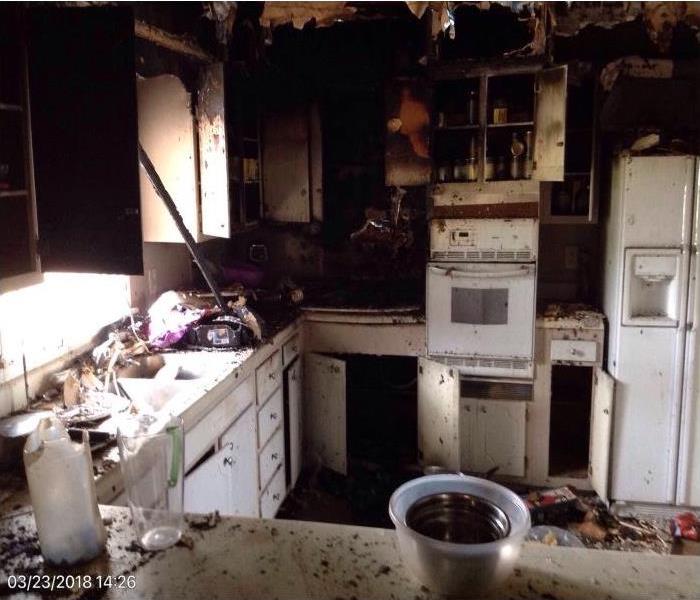 Grease Fire
Grease Fire
In a fire, seconds count. Seconds can mean the difference between residents of our community escaping safely from a fire or having their lives end in tragedy.
It reinforces why everyone needs to have an escape plan.
- Draw a map of your home with all members of your household, marking two exits from each room and a path to the outside from each exit.
- Practice your home fire drill twice a year. Conduct one at night and one during the day with everyone in your home, and practice using different ways out.
- Teach children how to escape on their own in case you can’t help them.
- Make sure the number of your home is clearly marked and easy for the fire department to find.
- Close doors behind you as you leave – this may slow the spread of smoke, heat, and fire.
- Once you get outside, stay outside. Never go back inside a burning building.
via http://www.nfpa.org/
Have you contacted your local fire department? See how you can get involved with them and your community to prevent house fires. Sometimes they will have events or give out smoke detectors for your home. Don't think this could never happen to you because it easily could. We don't have control over everything in our homes! Be safe and have a plan!
24/7 870-934-0501
Fires Can Be Caused By Heating Your Home This Winter
11/15/2017 (Permalink)
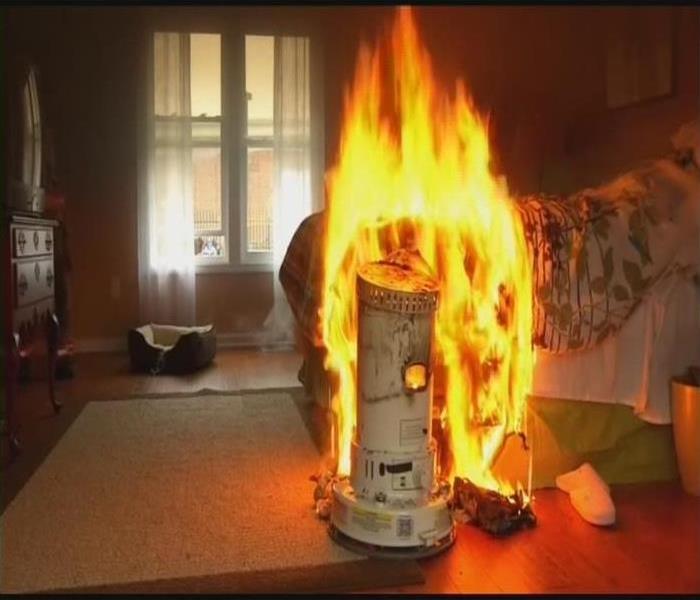 Space Heater Fire
Space Heater Fire
Eliminate Heating Hazards This Winter
The winter season is in full swing! The days are shorter and the temperatures are lower. No matter where you live, winter brings a change in the weather. In an effort to keep our homes and workplaces cozy, many people use alternative heat sources like fireplaces, portable space heaters, and wood burning stoves. According to the National Fire Protection Association, heating equipment is responsible for an estimated $1 Billion in property damage annually. Heating is a leading cause of residential fire deaths, making it important to review ways to help reduce the risk of a heating-related fire.
- Keep anything flammable at least three feet from heating equipment, like the furnace, fireplace, wood stove, or a portable space heater. Have a three-foot “kid-free zone” around open fires and space heaters.
- Remember to turn portable heaters off when leaving the room or going to bed.
- Always use the right kind of fuel, specified by the manufacturer, for fuel burning space heaters.
- Make sure the fireplace has a sturdy screen to stop sparks from flying into the room. Ashes should be cool before putting them in a metal container. Keep the container a safe distance away from your home.
- Have heating equipment and chimneys cleaned and inspected every year by a qualified professional.
- Have a qualified professional install stationary space heating equipment, water heaters or central heating equipment according to the local codes and manufacturer’s instructions.
- Test smoke alarms monthly.
Learn more by visiting our website at
www.SERVPROjonesboro.com
http://www.nfpa.org/News-and-Research/Fire-statistics-and-reports/Fire-statistics/Fire-causes/Appliances-and-equipment/Heating-equipment
Jonesboro Smoke and Soot Cleanup
8/10/2016 (Permalink)
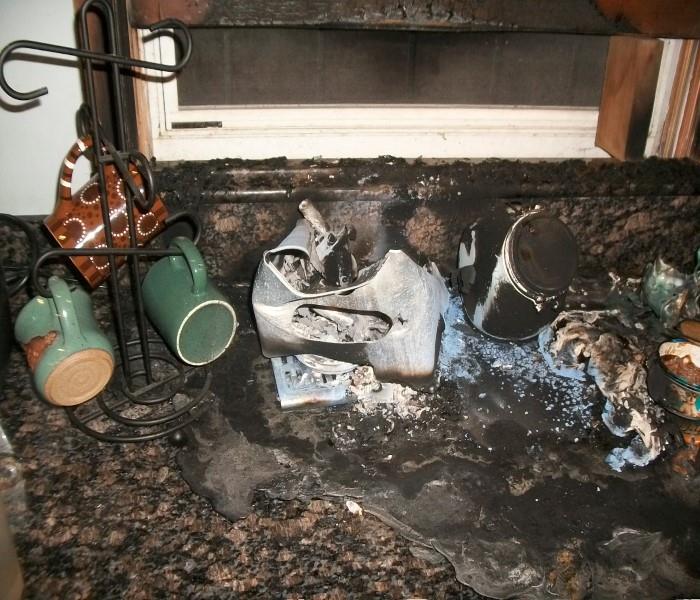 Smoke and Soot Damage Can Cause a Pervasive Odor in Your North East Arkansas Home.
Smoke and Soot Damage Can Cause a Pervasive Odor in Your North East Arkansas Home.
Smoke and soot is very invasive and can penetrate various cavities within your home, causing hidden damage and odor. Our smoke damage expertise and experience allows us to inspect and accurately assess the extent of the damage to develop a comprehensive plan of action.
Smoke and soot facts:
- Hot smoke migrates to cooler areas and upper levels of a structure.
- Smoke flows around plumbing systems, seeping through the holes used by pipes to go from floor to floor.
- The type of smoke may greatly affect the restoration process.
Different Types of Smoke
There are two different types of smoke–wet and dry. As a result, there are different types of soot residue after a fire. Before restoration begins, SERVPRO of Jonesboro will test the soot to determine which type of smoke damage occurred. The cleaning procedures will then be based on the information identified during pretesting. Here is some additional information:
Wet Smoke – Plastic and Rubber
- Low heat, smoldering, pungent odor, sticky, smeary. Smoke webs are more difficult to clean.
Dry Smoke – Paper and Wood
- Fast burning, high temperatures, heat rises therefore smoke rises.
Protein Fire Residue – Produced by evaporation of material rather than from a fire
- Virtually invisible, discolors paints and varnishes, extreme pungent odor.
Our Fire Damage Restoration Services
Since each smoke and fire damage situation is a little different, each one requires a unique solution tailored for the specific conditions. We have the equipment, expertise, and experience to restore your fire and smoke damage. We will also treat your family with empathy and respect and your property with care.
Have Questions about Fire, Smoke, or Soot Damage?
Call Us Today – 870-934-0501
Aspen Garden Apartments
7/23/2014 (Permalink)
SERVPRO recently completed a fire loss for Aspen Gardens. Our local office asked one of the Large Loss franchises to come assist due to the extensiveness of the loss. The benefit of being a SERVPRO franchise is that our resources are unimited. We can handle jobs of many size including this one with 50 apartments on three levels plus common areas. The Staff at Aspen Gardens were extremly happy with our services. Unfortunatley, many tenants did not have renters insurance but we were able to pack their contents into storage containers until the repairs can be made. SERVPRO of Jonesboro made this loss "Like it never even happened."
 Pro Tip: Avoid overloading electrical outlets and extension cords and ensure that all appliances are turned off when not in use.
Pro Tip: Avoid overloading electrical outlets and extension cords and ensure that all appliances are turned off when not in use.





 24/7 Emergency Service
24/7 Emergency Service










